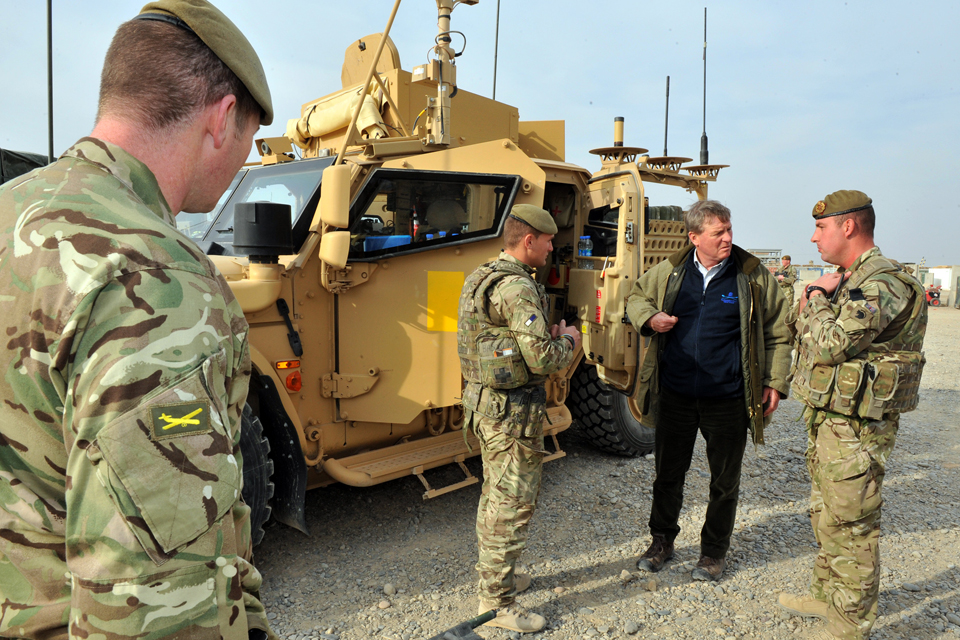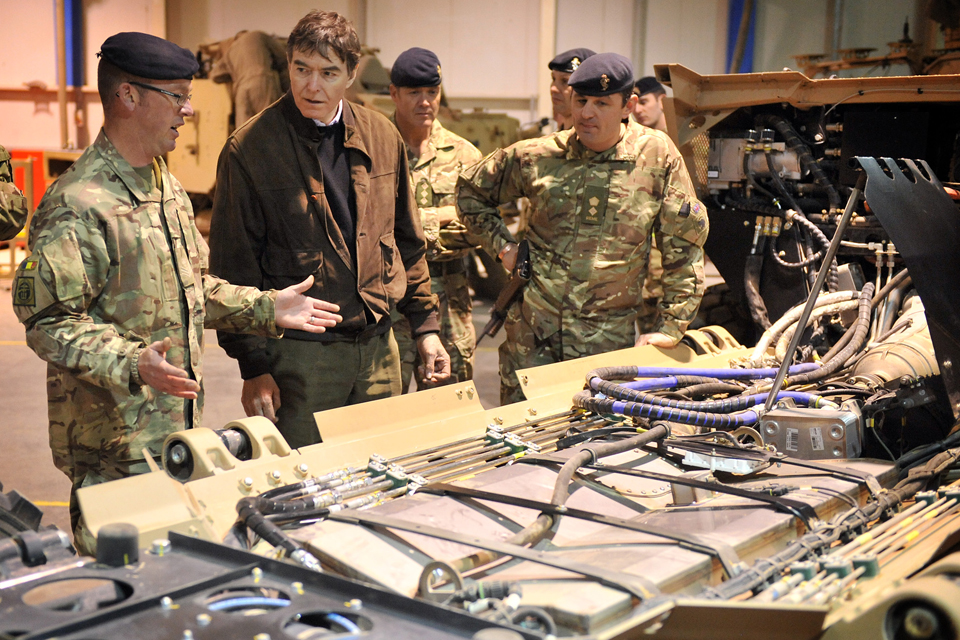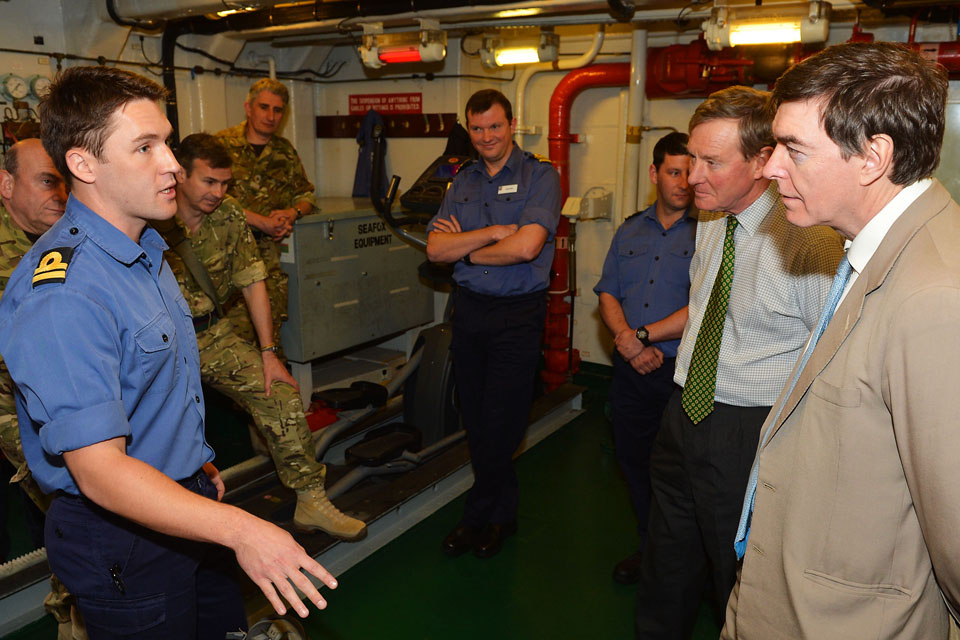UK Defence ministers visit Armed Forces overseas
Two UK Defence ministers have travelled to Afghanistan and the Middle East to visit British Service personnel on operations.
![Andrew Robathan and Philip Dunne talk with soldiers from the Royal Dragoon Guards and 1st Battalion The Duke of Lancaster's Regiment at Main Operating Base Lashkar Gah in Afghanistan [Picture: Corporal Mike O'Neill, Crown Copyright/MOD 2013]](https://assets.publishing.service.gov.uk/media/5a61843ced915d0afa3b198b/s300_TFH-4MechBde-2013-009-359.jpg)
Andrew Robathan and Philip Dunne speak with soldiers at Main Operating Base Lashkar Gah in Afghanistan
The Minister of State for the Armed Forces, Andrew Robathan, and the Minister for Defence Equipment, Support and Technology, Philip Dunne, visited personnel in Afghanistan to witness first-hand the progress being made in mentoring Afghan forces to take on their own security challenges.
During their visit, they also met with International Security Assistance Force (ISAF) and Afghan military commanders as well as Afghanistan’s Ministers for Defence and Interior in the capital Kabul.
Mr Robathan and Mr Dunne also saw the site of the Afghan National Army Officers’ Academy which is currently under construction but will play a major role in the UK military’s post-2014 non-combat commitment to Afghanistan.
In Helmand, where the majority of British personnel in Afghanistan are located, they held a meeting with Naeem Baloch, the provincial governor.

Andrew Robathan meets with soldiers of 1st Battalion The Duke of Lancaster's Regiment at Main Operating Base Lashkar Gah [Picture: Corporal Mike O'Neill, Crown Copyright/MOD 2013]
The comprehensive fact-finding mission saw the ministers briefed on the developing capabilities of the Afghan National Security Forces as well as on local governance and on future plans as ISAF forces prepare to finish their combat role by the end of 2014.
Their busy programme saw them visit the major UK bases at Camp Bastion and Lashkar Gah as well as a smaller base in Nahr-e Saraj district
They also spent time at Camp Shorabak, the headquarters of the 3rd Kandak of 215 Brigade of the Afghan National Army. The ministers met Afghan officers there alongside officers and troops from 1st Battalion The Royal Regiment of Scotland who are stationed there in an advisory role.
The ministers were met by Colonel Amin Jhan, the Afghan Brigade Executive Officer, who expressed his appreciation of UK support and the sacrifices made.
Major James Christie, Chief of Staff for the Brigade Advisory Group, said:
This visit has highlighted the operational strength and ambition of 3/215 Brigade of the Afghan National Army as we progress towards an important stage of security transition.
Mr Robathan said:
This is my fourth visit to Afghanistan and I have to say that the change is remarkable. We are here to help the Afghans to secure their own country and the transition is going extremely well.
We are drawing down gradually and handing over to the Afghans. What I have seen is that they are better and better prepared to take over.

Philip Dunne is shown a Foxhound vehicle stripped down during his visit to Afghanistan [Picture: Corporal Mike O'Neill, Crown Copyright/MOD 2013]
Mr Dunne added:
I was appointed to my new role in September so this is my first trip to Afghanistan. I’ve been extraordinarily impressed by both the scale of activity here and the quality of operations being conducted.
Mr Dunne saw mechanics in action as he visited both the Equipment Support Battalion and the Equipment Sustainability System at Camp Bastion where vehicles undergo ‘deep maintenance’ before being returned to operations.
Of these he said:
The ability of our own personnel and contractors to get vehicles back onto the ground - whether they have been disrupted on operations or require routine maintenance - is impressive.
The ministers also joined Air Chief Marshal Sir Stuart Peach, Commander Joint Forces Command, in a visit to the United Kingdom Maritime Component Command (UKMCC) headquarters in Bahrain on 10 January 2013.
The visit was made to provide a better understanding of the area in which the UK has provided an enduring naval commitment for more than 30 years.
During their time at the UKMCC, the visitors heard first-hand how the Royal Navy’s presence in the Middle East reassures our allies and protects both UK interests and those of the wider international community.
Following this, they called upon the ship’s companies of HMS Ramsey, one of the Royal Navy’s mine countermeasures vessels located in the region, and HMS Monmouth, a frigate currently deployed to the region for maritime security operations.

Andrew Robathan and Philip Dunne are briefed on board a Royal Navy warship in the Gulf [Picture: Leading Airman (Photographer) Will Haigh, Crown Copyright/MOD 2013]
Speaking about the Royal Navy’s contribution in the Gulf, Mr Robathan stated:
I was pleased to meet the commanding officers and ships’ companies of HMS Ramsey and HMS Monmouth and to see for myself the excellent work they are doing in the region, protecting not only the UK’s interests but also those of the global maritime community.
The UK is committed to a standing presence in the Gulf to ensure freedom of navigation in international waters. The Royal Navy has constantly operated, trained and exercised a number of its mine countermeasures vessels in the Gulf region for 6 years.
They are currently supported by a Bay Class Royal Fleet Auxiliary ship which, combined, make the UK one of the few nations that can truly demonstrate an integrated and expeditionary mine countermeasures capability.